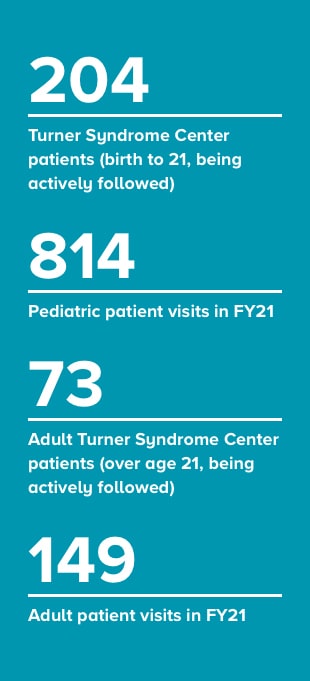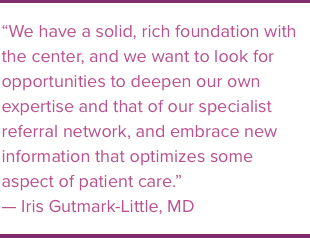Nationally Acclaimed Turner Syndrome Center Appoints New Director
Iris Gutmark-Little Succeeds Long-Time Mentor Philippe Backeljauw

Iris Gutmark-Little, MD, newly appointed director of Cincinnati Children’s Turner Syndrome Center, is carrying on the legacy of center founder and retiring director Philippe Backeljauw, MD. She is passionate about the relationships she has cultivated over the past 15 years with girls and young women living with Turner syndrome.
Gutmark-Little intends to build on the well-developed center her predecessor created, which draws patients regionally and nationally, from coast to coast.
“We have a solid, rich foundation with the center, and we want to look for opportunities to deepen our own expertise and that of our specialist referral network, and embrace new information that optimizes some aspect of patient care,” Gutmark-Little says.

She follows girls prenatally until age 21. After age 21, young women transition into Cincinnati Children’s Adult Turner Syndrome Center, which works closely with the pediatric center.
Gutmark-Little is seeking out clinicians from different specialties who want to delve more deeply into their own piece of the Turner syndrome puzzle. For example, she is collaborating with a gynecologist interested in gynecologic and fertility issues for this population. Cardiology, neuropsychology and otolaryngology contribute expertise for other aspects of the clinically and developmentally challenging syndrome.
She also wants to help drive formation of big research networks of well-developed Turner syndrome programs across the country to further optimize patient care.
Gutmark-Little’s current research focuses on how aortic and congenital heart disease evolve with Turner syndrome and how blood flow changes the aortic structure over time. Her team wants to help prevent potentially fatal aortic dissection and other cardiovascular issues.

She and her colleagues at Cincinnati Children’s also are investigating glucose metabolism abnormalities that may lead to diabetes, and they’re looking at issues ranging from menstrual bleeding to anxiety.
The challenges of Turner syndrome change as girls mature: Newborns may need heart surgery. In childhood, the focus may shift to growth issues and prescribing growth hormone therapy to help girls live more normal lives. Fertility issues may arise in later years. Anxiety and depression can affect all ages.
“Every patient is different, and a huge part of my role is to make sure these patients understand their disease,” Gutmark-Little says. “I love these families and patients. Our team is fully committed to overcoming barriers and making our patients the healthiest and happiest they can be.”
The center welcomes referrals. Contact Pediatric Endocrinology/Turner Syndrome Center or Iris.Little@cchmc.org.

